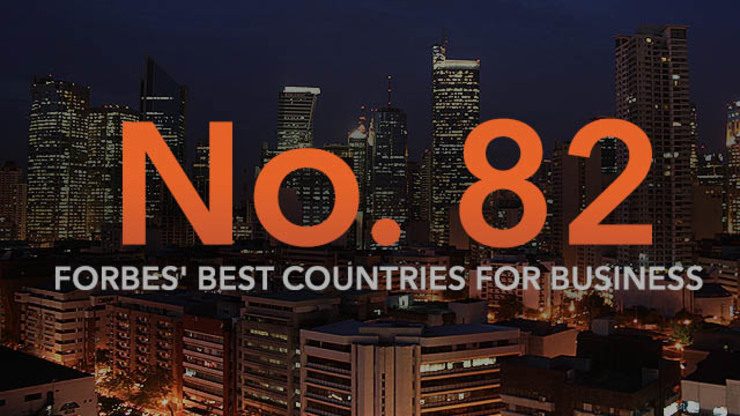SUMMARY
This is AI generated summarization, which may have errors. For context, always refer to the full article.

MANILA, Philippines – The Philippines climbed 8 notches to 82nd place in the annual Forbes list of “Best Countries for Business” for 2014.
The magazine noted that country has weathered global economic and financial downturns due to minimal exposure to troubled international securities; lower dependence on exports; relatively resilient domestic consumption; large remittances from 4- to 5-million overseas Filipino workers; and a rapidly expanding business process outsourcing industry.
The country ranked 90th in 2013.
Compared with its Southeast Asian neighbors, the Philippines fared better than Vietnam (111th), Cambodia (121st), Laos (130th), and Myanmar (143rd); but lagged behind Singapore (8th), Malaysia (37th), Thailand (62nd), and Indonesia (77th).
Forbes noted that the Philippines improved in 8 of 11 indicators:
- Market performance: Up 50 notches to 13th from 63rd
- Innovation: Up 15 notches to 51st from 66th
- Monetary freedom: Up 5 notches to 56th
- Property rights: Up 7 notches to 67th
- Technology: Up 6 notches to 68th
- Corruption: Climbed 8 places to 78th
- Personal freedom: Up two notches to 67th
- Red tape: Up one notch at 130th
The country’s rankings were unchanged in trade freedom (86th) and tax burden (101st), Forbes noted.
For investor protection, the Philippines slid 21 places to 124th in 2014 from 103rd in 2013, Forbes said.
There are 146 countries ranked in the list.
Gains under Aquino’s term
Forbes said though while the country averaged 4.5% growth during the Arroyo administration, poverty rate worsened as well.
Under the current Aquino administration, growth further accelerated but with limited progress thus unemployment hovers around 7% and underemployment is close to 20%, while more than 40% of the employed are in the informal sector.
Forbes added that the country’s current account balance also recorded consecutive surpluses since 2003; international reserves are at record highs; the banking system is stable; and the stock market was Asia’s second best-performer in 2012.
The business magazine also noted that the government’s efforts to improve tax administration and expenditure management have helped ease the Philippines’ tight fiscal situation and reduce high debt levels.
The country’s multiple credit ratings upgrade, the latest from Moody’s Investor Service, also helped improved the country’s standing, including relative ease in tapping domestic and international markets to finance its deficits.
Challenges ahead
Forbes noted the Philippines’ long-term challenges include reforming governance and the judicial system, building infrastructure, improving regulatory predictability, and the ease of doing business, attracting higher levels of local and foreign investments.
“The Philippine Constitution and the other laws continue to restrict foreign ownership in important activities/sectors such as land ownership and public utilities,” Forbes said.
Forbes culled data from Central Intelligence Agency, Freedom House, Heritage Foundation, Property Rights Alliance. Transparency International, the World Bank, and the World Economic Forum to compile its list.
Denmark best, Guinea worst
Denmark, Hong Kong, New Zealand, Ireland, Sweden, Canada, Norway, Singapore, Switzerland, and Finland were ranked by Forbes as the 10 best economies for business in 2014.
Algeria, Gambia, Yemen, Venezuela, Angola, Haiti, Myanmar, Libya, Chad, and Guinea are at the bottom 10 of the list. – Rappler.com
Add a comment
How does this make you feel?
There are no comments yet. Add your comment to start the conversation.